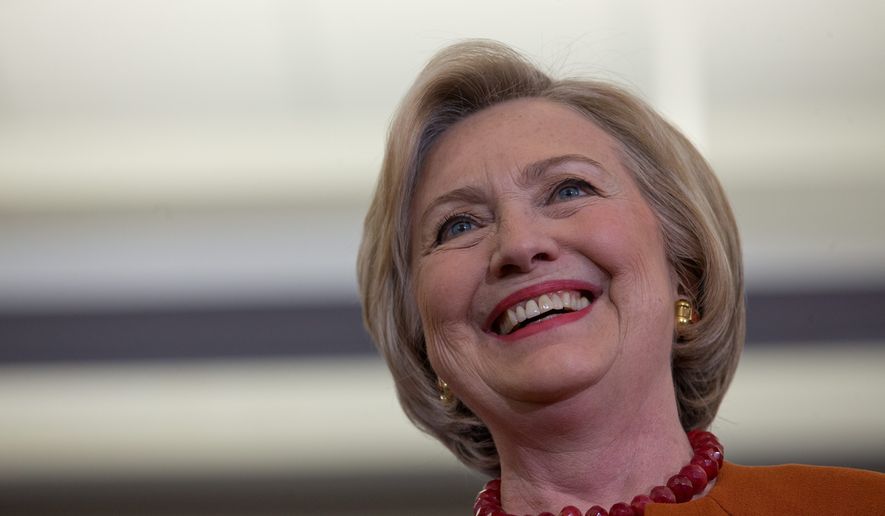Defying conventional political wisdom, progressive leaders say this is the one election cycle when the Democratic Party should head straight for the left lane — and stay there right through Election Day.
Should Hillary Clinton get the nomination and try to tack back to the center for the general election, she risks alienating the enthusiastic progressive voters who have flocked to self-described socialist Sen. Bernard Sanders, voters who could be badly needed in a close November contest. Liberal groups contend that far-left positions on health care, Social Security, college tuition and other domestic issues actually will play well with moderate and independent voters this cycle, and abandoning those stances would hurt, not help, the party’s eventual nominee.
A Donald Trump or Sen. Ted Cruz candidacy, progressives say, would motivate Democrats to get out and vote, even if they’re unhappy with Mrs. Clinton. A more centrist Mrs. Clinton, however, could drive down Democratic turnout, dampen enthusiasm and hurt the party’s chances of recapturing control of Congress, said Neil Sroka, spokesman for the powerful liberal PAC Democracy for America.
“It would be deadly for any Democratic nominee to listen to the K Street donor class in Washington and stake out positions in the general election that are, a) different than the positions you’ve taken in the primary, and b) further afield from where the majority of voters are,” Mr. Sroka said.
“Progressives, and Democrats writ large, are going to be motivated by the prospect of stopping Donald Trump and Ted Cruz. But the goal here is not just electing a president, but electing a Democratic Senate and possibly doing what was unthinkable a few months ago and taking back the House. … The question to me is, Will [Democrats] turn out in high enough numbers with enough dedication to not just keep the White House but to possibly retake the Senate and the House?”
But some analysts say a harder-edged ideological campaign could squander the opening to attract centrist voters.
As November approaches, Democrats — including hard-core progressives backing Mr. Sanders and the liberal positions he’s advocating — should recognize that a moderate Mrs. Clinton is their best chance for victory, according to Lara Brown, a political science professor at George Washington University who studies the evolution of political parties.
“At the end of the day, what you will see is that many people decide they’d rather have a pragmatic, experienced person in Hillary than they would the completely unknown Donald Trump, or the Sen. Sanders or Sen. Cruz ideologue.”
Assuming her email legal problems do not torpedo her campaign, “I think she would be the one politician who would be thriving right now,” Ms. Brown said. “This won’t necessarily make the progressives happy, but at the end of the day, if she is going up against a Trump or a Cruz, they will be thankful they did not actually have Sanders on the ticket. The Clintons are their right choice. They just don’t know it yet.”
For now, however, progressives are buying it and remain solidly behind Mr. Sanders. The Vermont senator has racked up big wins recently in states with strong progressive blocs of voters, and polls show him narrowly ahead of Mrs. Clinton in Wisconsin, which votes Tuesday.
Mirror argument
In some ways, it’s a mirror argument to the one conservative Republicans have made for years in the aftermath of Ronald Reagan. More mainstream nominees — from Bob Dole to Mitt Romney — fail to excite the base, they argue, while Reagan won two overwhelming electoral victories without sacrificing his conservative principles.
While Mrs. Clinton has been pulled to the left in this primary season and has adopted some of Mr. Sanders’ rhetoric on Wall Street reform and other issues deeply important to the party’s liberal base, Ms. Brown and other analysts say she’s likely to return to more moderate positions if and when she clinches the Democratic nomination.
But such a move could carry real consequences that extend even beyond the White House race. Polls have shown that a significant number of Sanders supporters — more than 40 percent, according to exit polling in recent primary states — say now they wouldn’t be satisfied with a Clinton candidacy.
Mrs. Clinton’s potential move to the center seemingly would deepen that dissatisfaction.
For her part, Mrs. Clinton is trying to strike a balance between being a progressive warrior and a practical politician who can appeal to wide swaths of voters, particularly independents and moderate Republicans. She’s consistently cast herself as a “progressive who gets things done” — a not-so-subtle shot at Mr. Sanders and his ambitious and expensive proposals on issues such as single-payer health care and free college tuition at all public universities.
But like progressive leaders, Mr. Sanders argues moving to the left will broaden the party’s appeal in November, and he made the case Sunday that his platform will bring in the voters the party needs in a general election.
“I think we can get virtually all of the Democratic vote. I think we can get a lot of the independent vote. I think we’ve got a lot of young people’s vote, working class people’s vote. I think we’re on the way to a victory if we can win the Democratic nomination,” he said on ABC’s “This Week” program on Sunday.
• Ben Wolfgang can be reached at bwolfgang@washingtontimes.com.




Please read our comment policy before commenting.